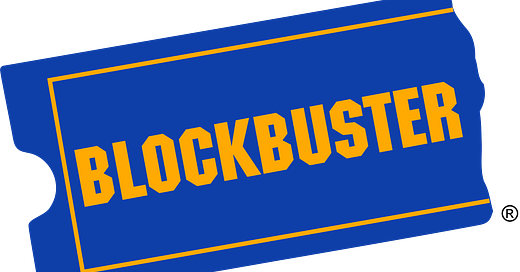Blockbuster’s Last Late Fee: The Slow, Stupid, Completely Avoidable Death They Never Saw Coming
Spoiler: Netflix didn’t kill them. They just showed up for the funeral
For a generation of us, Blockbuster wasn’t a store. It was a ritual.
Friday nights, suburban parking lots, the smell of carpet cleaner and stale popcorn, aisles of VHS tapes lined up like trophies. You weren’t just renting a movie — you were participating in a cultural moment.
And yet, despite owning our weekends, our late fees, and our passive-aggressive shame when Titanic was overdue again, Blockbuster didn’t lose to Netflix.
Blockbuster lost to Blockbuster.
Netflix didn’t slay the giant. They just waited for it to trip over its own arrogance, fall face-first into bankruptcy paperwork, and then politely offered streaming as a convenient alternative to retail embarrassment.
The Convenient Myth: Netflix Killed Blockbuster
It’s a clean story, sure.
Tech disrupts tradition.
The underdog wins.
Silicon Valley genius triumphs over retail dinosaur.
Except that’s not how it happened.
Blockbuster didn’t die because Netflix was brilliant.
Blockbuster died because Blockbuster stopped trying.
Scene One: The Acquisition That Started the Slow Bleed
The real unraveling began in 1994 when Viacom bought Blockbuster. Not because they loved video rentals, but because they loved leverage.
Blockbuster was profitable. Predictable. A cash machine to help Viacom finance its cable ambitions.
What followed wasn’t mismanagement so much as neglect dressed up in quarterly reports. Innovation slowed to a crawl. Debt piled up. Leadership changed hands like a bad poker hand no one wanted to keep.
By the time Viacom finally spun Blockbuster off in 2004, the damage was done. The patient was still breathing, but only because no one had bothered to check the pulse.
Scene Two: The Meeting That Should Have Changed Everything (But Didn’t)
Yes, Reed Hastings offered to sell Netflix to Blockbuster. Yes, they laughed.
It wasn’t arrogance. It was contempt.
Blockbuster couldn’t fathom that people would choose convenience over habit.
They believed customers wanted the ritual. The parking lot. The browsing. The fluorescent lights. The disinterested teenager reminding you your account had a late fee.
They believed people wouldn’t change because people hadn’t changed… yet.
They weren’t wrong — until they were.
Scene Three: The Streaming Deal That Died With Enron
Here’s the subplot almost nobody talks about: Blockbuster wasn’t blind to streaming.
They weren’t even late to it. They were early.
In 2000, they inked a 20-year deal for exclusive streaming rights with Enron Broadband.
Yes, that Enron.
The infrastructure was there. The foresight was there. The execution? Vaporized.
Enron collapsed under its own lies. Blockbuster’s digital future collapsed with it.
By the time Netflix started shipping DVDs in little red envelopes, Blockbuster wasn’t laughing anymore. They were scrambling. Slowly. Ineffectively. Publicly.
Scene Four: The Late Fees That Funded Their Delusion
Blockbuster’s business model wasn’t movies. It was punishment.
Late fees made up as much as 16% of their revenue.
They weren’t incentivized to innovate. They were incentivized to trap you.
The longer you forgot to return Speed 2: Cruise Control, the more they profited.
But people remember that. People remember how you made them feel.
And when someone offered an option without the shame, without the fees, without the 17-minute conversation to verify you lived at the same address? They left.
Scene Five: The Slowest Collapse in Retail History
By 2010, Blockbuster was bankrupt.
They still had 6,500 stores.
They still had 60,000 employees.
They still had time… technically.
But the writing wasn’t just on the wall. It was on the receipts, the customer surveys, the collective sigh of a public tired of being nickel-and-dimed for forgetting to rewind Batman & Robin.
Blockbuster didn’t die because of technology.
They died because they stopped earning the right to exist.
What It Really Means: This Isn’t Just About Blockbuster
Look around.
Today’s Blockbusters aren’t video stores. They’re banks. Airlines. Telecoms. Insurance companies.
Industries so bloated on their own dominance they mistake it for permanence.
They confuse habit for loyalty. Inconvenience for strategy. Market share for inevitability.
But there’s always a Netflix. Always a startup. Always a generation waiting to shrug off the inconvenience and say, “There has to be a better way.”
Blockbuster’s fall isn’t a fable about technology.
It’s a reminder: the future doesn’t wait for you to believe in it.
#BusinessHistory #Leadership #Innovation #Blockbuster #Netflix #Disruption #CorporateFailure #StreamingWars #ConsumerBehavior #LessonsLearned #Strategy #ChangeOrDie #BusinessCaseStudy #MediaIndustry #FailureToAdapt



